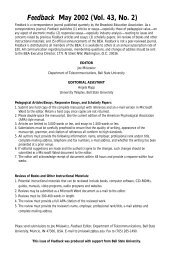PLANNING FOR GROWTH IN YEARS OF RESTRICTED RESOURCES
Feedback September 2003 - Broadcast Education Association
Feedback September 2003 - Broadcast Education Association
Create successful ePaper yourself
Turn your PDF publications into a flip-book with our unique Google optimized e-Paper software.
REVIEWFrankland, M. (2002). Radio man: The remarkable rise and fall of C. O.Stanley. London: The Institution of Electrical Engineers.After reading this book, there is no doubt that C. O. Stanley was a unique personality!As a young man, he moved from a teaching career to the newly developing industry ofadvertising. Stanley re-invented himself, changing his name from Charlie to C. O.when he opened his own advertising firm six months after he lost his first job inadvertising. The epitome of a sales/marketing genius, Stanley quickly became knownfor the creativity produced by people in his firm. Stanley was a risk-taker, and notalways with his own money. As radio began to take root in England, Stanley convincedPye, a small radio manufacturing company, to sell the company to him. To finance theventure, he carried a "portable" radio to a meeting with Barclays Bank’s Head Office toconvince the senior manager to cover his check. Minutes into his sales pitch, Stanleytuned in to a BBC presentation of music. He won support of the manager,guaranteeing him there was quite a bit of money to be made in selling radios.Frankland painstakingly details Stanley’s ownership and development of PyeElectronics through its interests in radio, television, radar, and mobile radio to itseventual demise. Frankland consulted original documents from the company, peopleintegral to the company, and he interviewed principle players to create a clear picture ofthe downfall of the company. As a prize-winning journalist, Frankland thoroughlyresearched C. O. Stanley’s impact on the development of the British electronicsindustry. This work provides American readers with an interesting perspective on thehistory and development of radio and television broadcasting in Britain as it developedconcurrently with American radio and television broadcasting.Reviewed by Margaret O. Finucane, John Carroll University, mfinucane@jcu.edu71Feedback September 2003 (Vol. 44, No. 4)
















